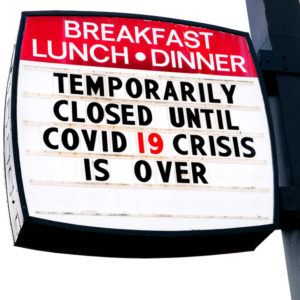It’s human nature to want to hold someone responsible for a crisis. It can even become an overwhelming, emotional need.
So it’s understandable that people who are being furloughed, laid-off, or having their wages cut might blame their employers.
Even for those not directly affected, who are hearing about layoffs from the media or friends and family, it’s easy to blame the companies that are making drastic cuts.
But it would be wrong. In fact, the opposite is true.
Business (and non-profit) leaders are shutting or slowing operations as a public service to help minimize the spread of the virus. And this is good. It’s for the best. We want public health to be the most important priority right now.
The financial reality of operating a business is that when revenue shrinks, the business can’t cover its costs, including labor. That’s the reality that has kicked in — and will continue — for many businesses.
In normal times, we can say that business leaders have some responsibility to be flexible, to plan for downturns and innovate their way into maintaining a steady footing.
But these are not normal times. Business leaders could not have anticipated this abrupt and steep downturn in business before January this year. It’s not their fault.
And what’s the alternative?
Keeping most operations running as normal would turbo charge the spread of the virus. So business leaders, either on their own or forced by governors, are doing the right thing to slow the spread of the virus by closing or drastically reducing operations. We should be thanking them, not blaming them.
Many business leaders are experiencing the most difficult times of their lives. Laying off employees is always painful, and for leaders who feel protective and emotionally connected to their employees, it is especially painful.
Many business leaders feel that their employees are like family. Imagine how you would feel if you had to lay off your family.
If we had stronger safety nets in our country, the pain would be less. Imagine if all employees being laid off could count on 100 percent of their wages in unemployment insurance and a continuation of their health insurance and retirement benefits.
That’s the kind of thing that many in Congress have pushed for in the economic rescue packages responding to the COVID-19 crisis. But stronger, permanent safety nets leading into the pandemic would have lessened both the economic crisis and the public health crisis that is causing it.
Without national paid sick leave and paid family and medical leave, many employees don’t stay home when they get sick. That’s a known fact.
Bring COVID-19 into the picture and the lack of national paid leave means that some employees, gig workers, independent contractors and others went to work during the past two months — even if they had symptoms of the virus. That put co-workers at risk, and likely increased the spread of the virus.
One thing we can blame business leaders for is lobbying against stronger safety nets, such as paid leave. Business leaders as a group carry a lot of clout in preventing such systems from receiving due consideration by policymakers.
The standard line “it’s bad for business” dominates policy discussions that involve improvements that might help when disruption hits workers — whether those disruptions are big or small.
Responsible business leaders have long understood that such arguments are bad for the country. To protect short-term profits by opposing longer-term investments that prioritize people (and planet) along with profits is not just selfish and inhumane.
It increases the risk for future disruption — for every business. Our current crisis is a deeply unfortunate example.
Disruption will always be part of our economic system. It’s the flip side of the freedom to innovate. With entrepreneurs and investors free to invent new products, services and business strategies, we have a fast-growing economy and a fast-improving standard of living.
But, as a country, we have not seriously addressed the inevitable economic fallout — large and small — that is an inevitable part of the system. It’s as if we’ve pretended that companies don’t go out of business, industries don’t make massive shifts or markets never change.
Therefore our people don’t need protecting from such disruptions.
The current crisis shows how dangerous that ignorance is. We can hope that once we are through the public health crisis, business leaders will push policymakers to establish much stronger, permanent economic safety nets. Planning for and protecting people from inevitable disruption is better than ignoring the inevitable.
For now, in response to the COVID-19 pandemic, business leaders — from tiny companies to giant multinational corporations — are doing the right thing and shutting or rearranging their businesses to reduce the spread of the virus. That has caused a massive economic crisis.
But let’s not blame them for doing the right thing. Let’s applaud them and once the crisis is over, urge them to keep doing the right thing.

